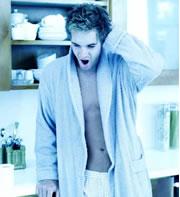 Too early to do maths: thinking is tricky in the first few minutes of the morning.© Punchstock
Too early to do maths: thinking is tricky in the first few minutes of the morning.© PunchstockIf you're the type to stumble about as though drunk on first getting out of bed, scientists can now back up your behaviour as reasonable. A team has shown that people are as woozy when they wake as they are after drinking several beers.
Sleep researchers have long been interested in the symptoms of sluggishness and disorientation that people experience after awakening, which they call sleep inertia. Now they have measured exactly how hopeless our early-morning brains are at carrying out everyday tasks.
To do this, Kenneth Wright at the University of Colorado, Boulder, and his co-workers looked at the mental handicap caused by sleep inertia, and compared it with the detriment of having stayed up all night.
They allowed nine volunteers to enjoy roughly eight hours' nightly slumber for four weeks, the final week taking place in the lab. After a final pleasant night's sleep, they woke each person and immediately, without even a cup of coffee, asked them to calculate a string of sums. A minute after waking, they scored how many problems each one totted up correctly over two minutes. The test was then repeated after 20 minutes and again at regular intervals until the subjects had gone a full 26 hours without sleep.
I'll be awake in a minute
Brain power was worse in the first few minutes after awakening than it was after a whole night's sleep deprivation, they report in the Journal of the American Medical Association1. The individuals scored around 65% of their best ever performance when they first awoke, and 83% or better throughout the rest of the test period.
Wright says that the loss of brain power at daybreak is equivalent to that caused by a 0.08% blood alcohol level, which is typically reached after quaffing four bottles of beer. "We haven't recognized in the past how bad it could be," Wright says. "It is a little surprising."
The study has implications for people who have to wake up and react immediately, such as doctors on call or resting aeroplane pilots roused in an emergency. These people should be made aware that they are operating severely below par, Wright says, so that they can wait a few minutes before making life-or-death decisions.
Because the team studied people who were otherwise well-rested, the result also suggests that others, who are already sleep-deprived, might experience an even more precipitous drop in mental functions when they stir. So too might those waking from the deeper doze of a short nap.
Just a few minutes more
ADVERTISEMENT
Even for the average person, waiting for those first few minutes to pass, by lying in bed and avoiding any taxing tasks, might help avoid mishaps. It could also alleviate people's need for a morning cup of coffee, Wright suggests.
Sleep researchers are just beginning to explore what underlies and explains morning grogginess. A brain imaging study from 2002 showed that areas of the brain involved in problem solving and complex behaviours are particularly slow to rev up on awakening2. One idea is that sleep inertia may result from processes in the brain that normally work to keep us asleep and ensure that we have a good night's kip.
Scientists now know it takes somewhere between one and twenty minutes to recover from the effects of sleep inertia. Next they need to figure out exactly how long this period is, and hence how long we need to fully wake up, says Derk-Jan Dijk, director of the Surrey Sleep Research Centre, UK. "That's the crucial point," he says.
